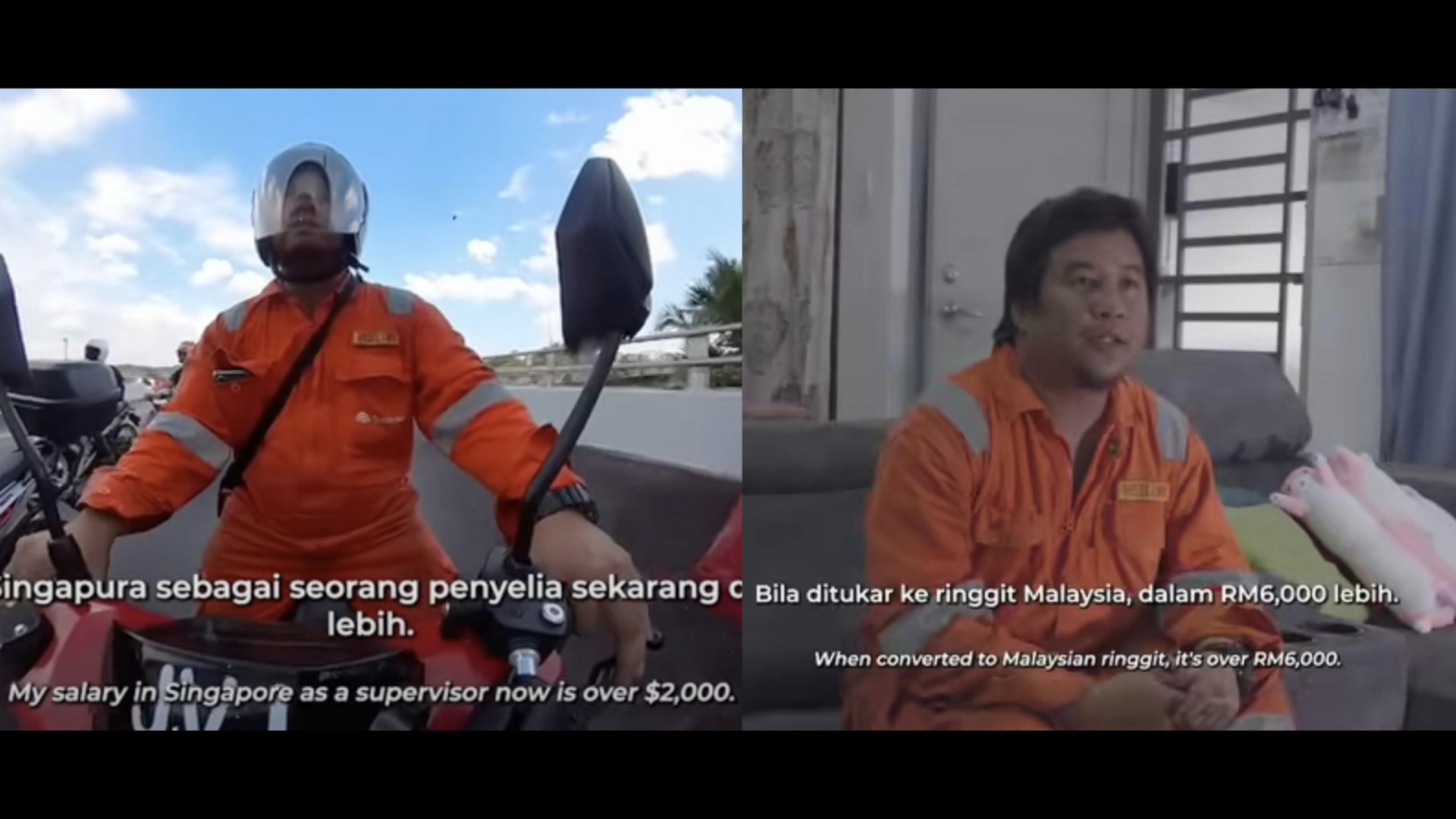SINGAPORE: Besides the high exchange rate of the Singapore dollar, many Malaysians work in Singapore to build a better life through hard work and sacrifice.
One Mr Mohd Aminurashid Ali Akbar, a 36-year-old worker in the shipping sector, has commuted across the Causeway daily for 14 years! Now, he owns three properties in Malaysia, thanks to his perseverance and hard work.
In Berita Harian’s Chasing Windfalls in Singapore video on YouTube, Mr Mohd Aminurashid shared, “Fourteen years ago, I was just a palm oil factory worker in Malaysia, earning a daily wage of RM13 (about S$3.84). Now, I’ve been working in Singapore for 14 years.
I usually leave home around 5:00 am. If I’m late, I could get stuck on the Causeway due to the heavy traffic of motorcycles trying to enter Singapore. It’s normal because there are a lot of Malaysians who work in Singapore, too.”
Initially, he didn’t plan to work in Singapore, saying it was “not an easy decision.” The decision came with numerous challenges, including being away from family and facing job uncertainties, especially during the pandemic.
“Working here [Singapore] indeed requires a lot of sacrifice in terms of time and energy because I work in a shipyard.”
Despite the hardships, he persevered for the sake of his family. “When I first started working, I started from the bottom, and the work was very stressful at the shipyard. And I once felt like quitting.
But thinking about my responsibility to my family, my wife who always gives me encouragement, and our special needs child, I continued to work in Singapore to earn more income to bring home to my children and family.“
He shared how he previously worked at a factory in Malaysia, earning only about RM1,300 (about S$383.60) per month.
“My salary in Singapore as a supervisor now is over S$2,000. When converted to Malaysian Ringgit, it’s over RM6,000, and my salary is more than what I earned in Malaysia,” he said.
With his earnings, he has bought three houses, renting out two and living in one with his family. Sharing his advice to young people who are just starting work in Singapore, he said:
“When you receive your salary, save that salary properly. Use it wisely. Because, as Malaysians with work permits, we don’t have CPF. So the salary we earn must be saved and planned properly.”
Singaporeans online praised Mr Mohd Aminurashid’s hard work. One commenter noted, “Hard work pays…would you do it?” Another wrote, “Hard work pays off for those who work for it.”
One commenter added, “Waking up at 4 in the morning and returning home at 9 pm is pretty hard for people who are always fighting for work-life balance.”
However, not all comments were supportive. One user remarked, “Singapore is a country that makes citizens from other countries rich… and lets its own citizens become slaves. Work until they’re old, work until they die.”
Yet another defended the hard work of the Malaysian man, saying, “Good for him, lah. Why criticise the hardworking and financially prudent?
A different person might have spent his money on partying, buying wasteful things and still end up broke despite having advantages in terms of exchange rate.”
Berita Harian reported that the number of Malaysians seeking jobs in Singapore surged by around 60% post-COVID-19 pandemic, per several recruitment agencies.
Besides the favourable exchange rate, many Malaysians are drawn to Singapore because of its rapidly recovering economy and higher living costs.
Commonly sought-after jobs include those in administrative, production, and food and beverage sectors, which generally do not require high qualifications.
According to the Department of Statistics Malaysia (DOSM), around 66% of Malaysian workers in Singapore earn a gross salary ranging from S$1,500 (RM5,190) to S$3,599 (RM12,452) per month. Meanwhile, 18.5% earn between S$3,600 and nearly S$10,000 monthly.
However, not all stories have happy endings. Mr Mohd Fikri Ahmad Tajudin, a 31-year-old project manager, was killed in an accident while commuting home from work in Singapore in March 2024.
Yet his wife, Nabihah Ibrahim, who is pregnant with their second child, expressed no regret over their decision to work in Singapore despite the risks involved. /TISG
Featured image by Depositphotos

